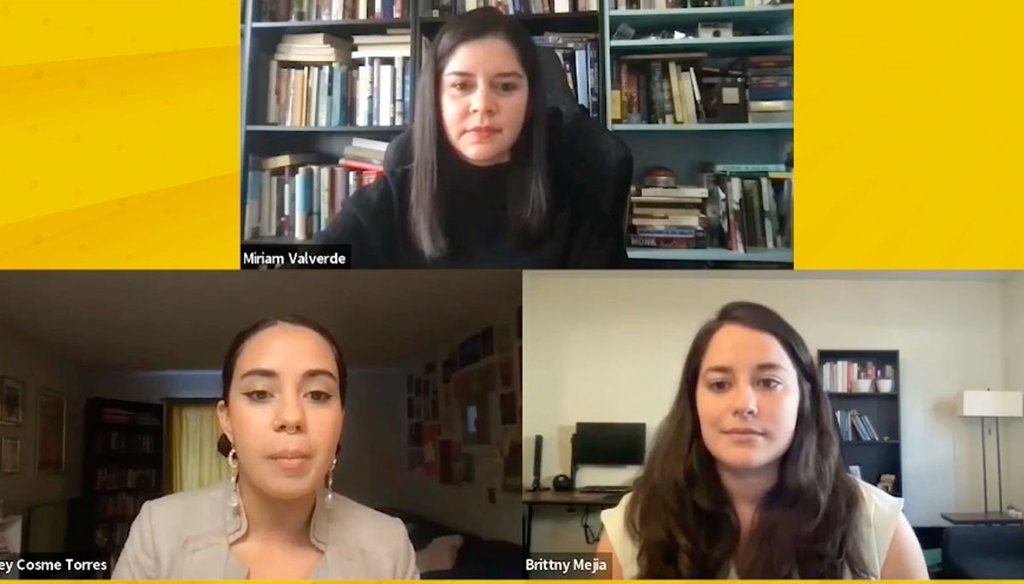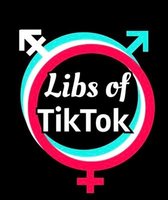Stand up for the facts!
Our only agenda is to publish the truth so you can be an informed participant in democracy.
We need your help.
I would like to contribute

PolitiFact Deputy Editor Miriam Valverde, Los Angeles Times reporter Brittny Mejia and Miami Herald reporter Lesley Cosme Torres discuss Spanish-language misinformation during United Facts of America: A Festival of Fact-Checking on Sept. 29, 2022.
The threat of misinformation is ever present, and the fast-approaching midterm elections are a breeding ground for misleading narratives to spread on social media. That’s especially true for Latinos in the United States who speak only Spanish.
There aren’t as many Spanish-speaking journalists and media outlets in the U.S., and social media companies invest fewer resources into detecting Spanish-language misinformation. This makes it easier to spread and harder to confront.
PolitiFact Deputy Editor Miriam Valverde held a discussion with Brittny Mejia of the Los Angeles Times and Lesley Cosme Torres of the Miami Herald about what can be done to combat misinformation in Spanish during United Facts of America: A Festival of Fact-Checking on Sept. 29.
The topics of misinformation and disinformation aren’t as widely discussed in Spanish-speaking circles, said Mejia, whose coverage focuses on Latinos. Conversely, she said, the children of immigrants are often hyperaware of disinformation after seeing its negative impact on their families.
"I've interviewed a lot of younger generations who describe false information as having fractured their family," Mejia said.
Misinformation surrounding the safety of the COVID-19 vaccine and the results of the 2020 election were especially prone to misleading narratives, Mejia said.
Cosme Torres said that in Florida, voting misinformation is back this election cycle. False claims about who can vote and how are popping up on social media platforms such as YouTube, WhatsApp and Telegram.
This misinformation doesn’t just spread online. In Miami, Spanish-language radio stations are also culprits. Cosme Torres said Latinos tend to turn to the same places they would get news from in their home countries. For many, that’s the radio.
"I think the problem with radio stations specifically is it's hard to tell what's opinion-based and what's fact-based," Cosme Torres said.
Spanish speakers also turn to people they trust to stay informed and are more likely to believe information sent by people they know.
This was apparent with the COVID-19 vaccine, whether it was a church pastor saying "the vaccine is the mark of the devil" or a family member sharing a YouTube video via group message claiming the vaccine was dangerous.
"It's your tia (aunt). It's your cousin. It's someone that you're like, ‘Oh, I trust them. Why would they lie or why would they share something that's false?’" Mejia said. "And then it just is trusted because you’re a family member."
Combating misinformation that comes from trusted sources is a challenge, Mejia said. This is especially true in Latino families that use WhatsApp to communicate. Unlike Facebook posts, TikTok videos or tweets, WhatsApp messages are encrypted and aren’t public. This makes it nearly impossible for social media companies and journalists to monitor them.
Meta, which owns WhatsApp, has started fact-checking tip lines on the app, Cosme Torres said. Users can flag misinformation to news organizations via the app, and independent fact-checkers can verify the claims.
Fact-checkers, journalists and social media companies aren’t the only groups that can help combat Spanish-language misinformation, said Mejia and Cosme Torres. Individuals play a big role, too.
"It starts within your own family," Mejia said. "If you're seeing this kind of misinformation and disinformation thrive, I feel like a good first step is having conversations internally."
Mejia said this was particularly important for misinformation around the pandemic and the vaccine. Falling prey to false narratives about these topics could be life-threatening for her family members.
But Cosme Torres said the way you conduct those conversations is key. It’s important to be respectful so as not to push family members further away. She said one of her sources flew to his family's home country and taught them tools to verify information themselves.
People are more receptive to deciding the veracity of information themselves than being told what to believe, Cosme Torres said.
Our Sources
See links in story.














































